2023年外研版中考英语复习 第一节 同义词、近义词的归纳总结和辨析( 代词、连词类辨析 )课件(共20张PPT)
文档属性
| 名称 | 2023年外研版中考英语复习 第一节 同义词、近义词的归纳总结和辨析( 代词、连词类辨析 )课件(共20张PPT) |  | |
| 格式 | pptx | ||
| 文件大小 | 435.6KB | ||
| 资源类型 | 教案 | ||
| 版本资源 | 外研版 | ||
| 科目 | 英语 | ||
| 更新时间 | 2023-06-02 17:08:35 | ||
图片预览

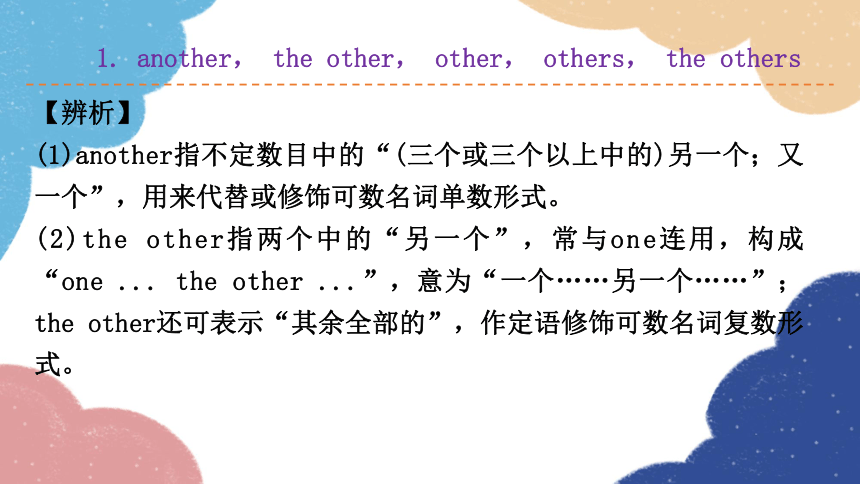
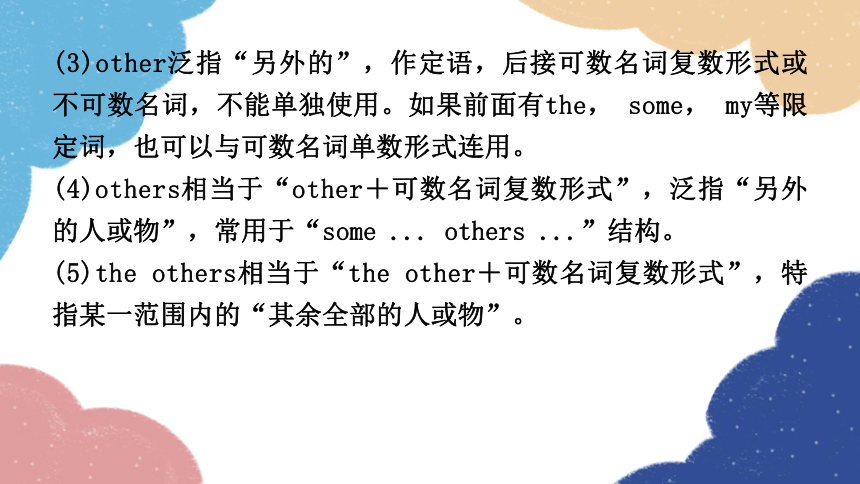

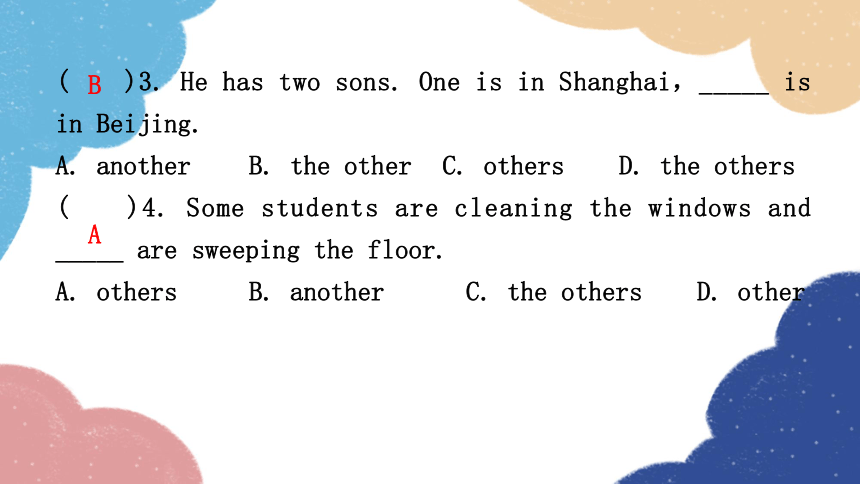
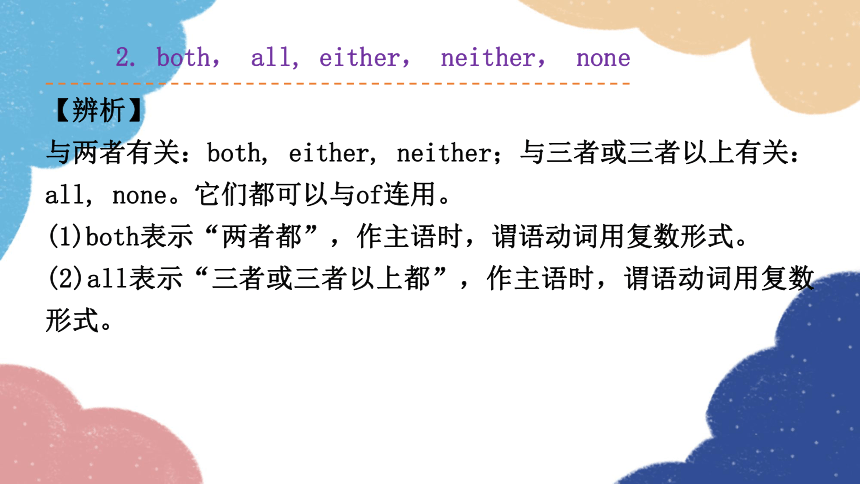
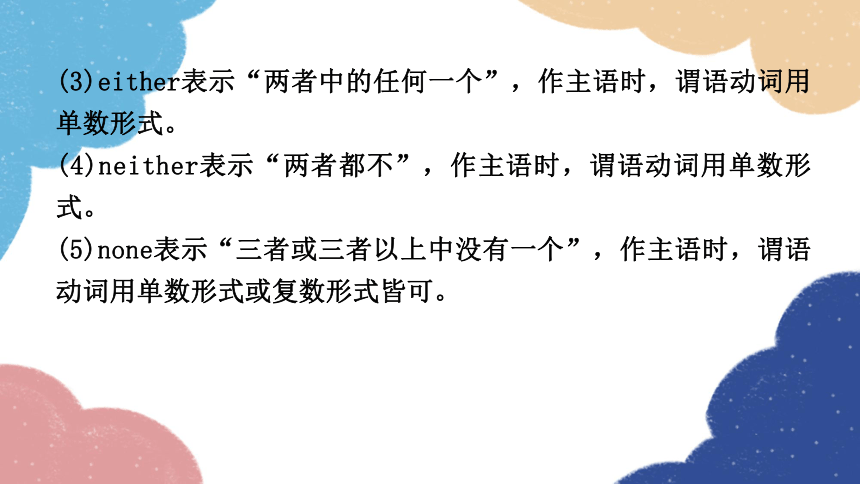
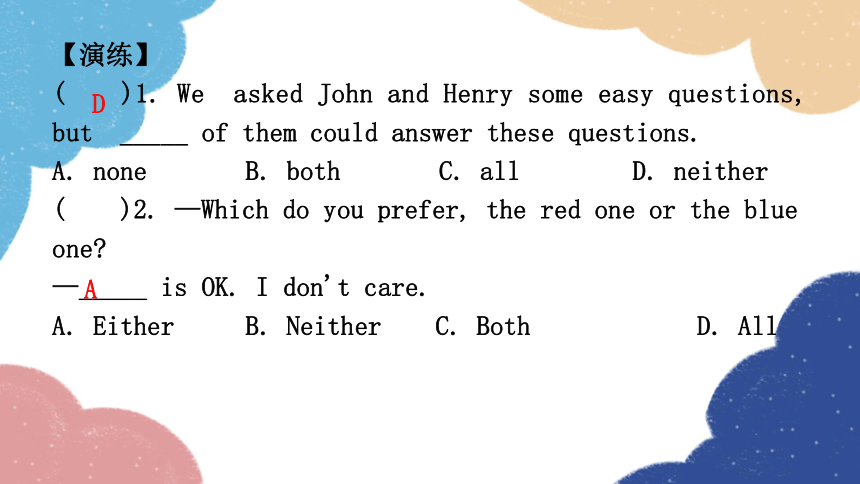
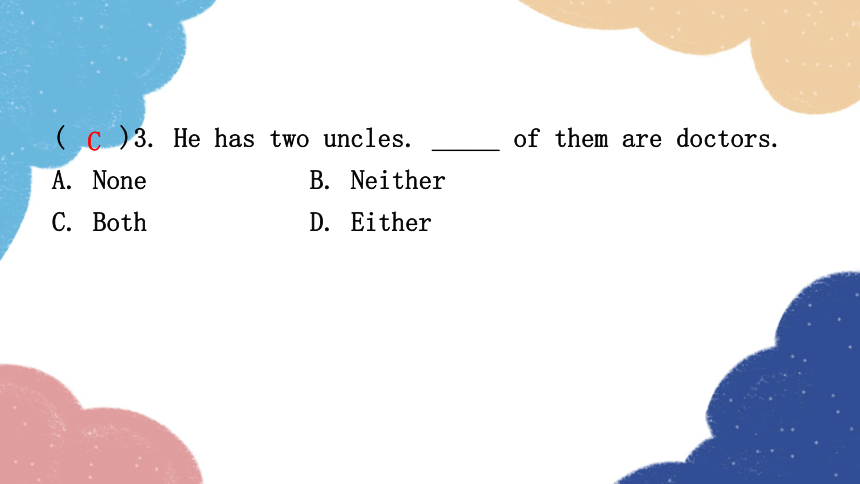
文档简介
(共20张PPT)
中考高频词汇突破
第一节 同义词、近义词的归纳总结和辨析
代词、连词类辨析
【辨析】
(1)another指不定数目中的“(三个或三个以上中的)另一个;又一个”,用来代替或修饰可数名词单数形式。
(2)the other指两个中的“另一个”,常与one连用,构成“one ... the other ...”,意为“一个……另一个……”;the other还可表示“其余全部的”,作定语修饰可数名词复数形式。
1. another, the other, other, others, the others
(3)other泛指“另外的”,作定语,后接可数名词复数形式或不可数名词,不能单独使用。如果前面有the, some, my等限定词,也可以与可数名词单数形式连用。
(4)others相当于“other+可数名词复数形式”,泛指“另外的人或物”,常用于“some ... others ...”结构。
(5)the others相当于“the other+可数名词复数形式”,特指某一范围内的“其余全部的人或物”。
【演练】
( )1. I don't think the coat is good enough. Can you show me _____?
A. another B. other C. others D. the other
( )2. There are thirty books on the bookshelf. Five are mine, _____ are my father's.
A. others B. the other C. the others D. other
A
C
( )3. He has two sons. One is in Shanghai,_____ is in Beijing.
A. another B. the other C. others D. the others
( )4. Some students are cleaning the windows and _____ are sweeping the floor.
A. others B. another C. the others D. other
B
A
【辨析】
与两者有关:both, either, neither;与三者或三者以上有关:all, none。它们都可以与of连用。
(1)both表示“两者都”,作主语时,谓语动词用复数形式。
(2)all表示“三者或三者以上都”,作主语时,谓语动词用复数形式。
2. both, all, either, neither, none
(3)either表示“两者中的任何一个”,作主语时,谓语动词用单数形式。
(4)neither表示“两者都不”,作主语时,谓语动词用单数形式。
(5)none表示“三者或三者以上中没有一个”,作主语时,谓语动词用单数形式或复数形式皆可。
【演练】
( )1. We asked John and Henry some easy questions, but _____ of them could answer these questions.
A. none B. both C. all D. neither
( )2. —Which do you prefer, the red one or the blue one
—_____ is OK. I don't care.
A. Either B. Neither C. Both D. All
D
A
( )3. He has two uncles. _____ of them are doctors.
A. None B. Neither
C. Both D. Either
C
【辨析】
三者都可用作代词,指代前面提到的名词。
(1)it意为“它”,指代前面提到过的人或物。(指相同的人或物)
(2)one表示泛指,指前面提到过的那类人或物中的任何一个,用来代替单数可数名词,其复数形式为ones。(指同类中不同的人或物)
3. it, one, that
(3)that意为“那;那个”,既可以指代前面提到过的人或物,也可以指代同一类别中的“另外一个”,用来代替单数可数名词或不可数名词,其复数形式为those。(指相同的人或物,也可以指同类中不同的人或物,此时多用于比较级句子中)
【演练】
( )1. —A latest Shenzhen Daily,please!
—Only one copy(一份) left. Would you like to have _____, sir?
A. one B. it C. this D. that
( )2. —Do you need a new dictionary, Susan?
—No, Mom. My uncle bought me _____ yesterday.
A. one B. it C. the one D. another
B
A
( )3. The weather in London is different from _____ in Beijing.
A. that B. one C. it D. those
A
【辨析】
(1)none既可指人也可指物,其后可与of连用。none作主语时,谓语动词用单数形式或复数形式皆可。
(2)no one相当于nobody,意为“没有人”,只可以指人,不可指物,其后不可与of连用。no one作主语时,谓语动词只能用单数形式。
4. none, no one
【演练】
( )1. A car hit a bus with many people on it this morning. Luckily, _____ of the people got hurt.
A. none B. no one
C. either D. neither
( )2. —Who is in the classroom —_____.
A. None B. No one
C. No body D. Neither
A
B
【辨析】
(1)each指两者或两者以上的人或事物中的“每一个”,其后可与of连用。each强调个体,修饰可数名词单数形式,作主语时,谓语动词用单数形式。
(2)every指整体中的“每一个”,其后不可与of连用。every强调整体情况,修饰可数名词单数形式,作主语时,谓语动词也要用单数形式。
5. each, every
【演练】
( )1. _____ of us should obey the traffic rules.
A. Every B. Each C. Either D. None
( )2. _____ student in the class is listening to the teacher carefully.
A. Every B. Each C. Either D. None
B
A
【辨析】
(1)because是连词,后接原因状语从句,还可以用来回答由why引导的特殊疑问句。because与so不能连用。
(2)because of是介词短语,后接名词、代词、动名词,在句中作状语。
6. because, because of
【演练】
( )1. _____ he was badly ill, he couldn't go to school yesterday.
A. So B. Because C. Because of D. Until
( )2. The sports meeting will be put off _____ the bad weather.
A. because B. so C. because of D. if
B
C
THANKS!
中考高频词汇突破
第一节 同义词、近义词的归纳总结和辨析
代词、连词类辨析
【辨析】
(1)another指不定数目中的“(三个或三个以上中的)另一个;又一个”,用来代替或修饰可数名词单数形式。
(2)the other指两个中的“另一个”,常与one连用,构成“one ... the other ...”,意为“一个……另一个……”;the other还可表示“其余全部的”,作定语修饰可数名词复数形式。
1. another, the other, other, others, the others
(3)other泛指“另外的”,作定语,后接可数名词复数形式或不可数名词,不能单独使用。如果前面有the, some, my等限定词,也可以与可数名词单数形式连用。
(4)others相当于“other+可数名词复数形式”,泛指“另外的人或物”,常用于“some ... others ...”结构。
(5)the others相当于“the other+可数名词复数形式”,特指某一范围内的“其余全部的人或物”。
【演练】
( )1. I don't think the coat is good enough. Can you show me _____?
A. another B. other C. others D. the other
( )2. There are thirty books on the bookshelf. Five are mine, _____ are my father's.
A. others B. the other C. the others D. other
A
C
( )3. He has two sons. One is in Shanghai,_____ is in Beijing.
A. another B. the other C. others D. the others
( )4. Some students are cleaning the windows and _____ are sweeping the floor.
A. others B. another C. the others D. other
B
A
【辨析】
与两者有关:both, either, neither;与三者或三者以上有关:all, none。它们都可以与of连用。
(1)both表示“两者都”,作主语时,谓语动词用复数形式。
(2)all表示“三者或三者以上都”,作主语时,谓语动词用复数形式。
2. both, all, either, neither, none
(3)either表示“两者中的任何一个”,作主语时,谓语动词用单数形式。
(4)neither表示“两者都不”,作主语时,谓语动词用单数形式。
(5)none表示“三者或三者以上中没有一个”,作主语时,谓语动词用单数形式或复数形式皆可。
【演练】
( )1. We asked John and Henry some easy questions, but _____ of them could answer these questions.
A. none B. both C. all D. neither
( )2. —Which do you prefer, the red one or the blue one
—_____ is OK. I don't care.
A. Either B. Neither C. Both D. All
D
A
( )3. He has two uncles. _____ of them are doctors.
A. None B. Neither
C. Both D. Either
C
【辨析】
三者都可用作代词,指代前面提到的名词。
(1)it意为“它”,指代前面提到过的人或物。(指相同的人或物)
(2)one表示泛指,指前面提到过的那类人或物中的任何一个,用来代替单数可数名词,其复数形式为ones。(指同类中不同的人或物)
3. it, one, that
(3)that意为“那;那个”,既可以指代前面提到过的人或物,也可以指代同一类别中的“另外一个”,用来代替单数可数名词或不可数名词,其复数形式为those。(指相同的人或物,也可以指同类中不同的人或物,此时多用于比较级句子中)
【演练】
( )1. —A latest Shenzhen Daily,please!
—Only one copy(一份) left. Would you like to have _____, sir?
A. one B. it C. this D. that
( )2. —Do you need a new dictionary, Susan?
—No, Mom. My uncle bought me _____ yesterday.
A. one B. it C. the one D. another
B
A
( )3. The weather in London is different from _____ in Beijing.
A. that B. one C. it D. those
A
【辨析】
(1)none既可指人也可指物,其后可与of连用。none作主语时,谓语动词用单数形式或复数形式皆可。
(2)no one相当于nobody,意为“没有人”,只可以指人,不可指物,其后不可与of连用。no one作主语时,谓语动词只能用单数形式。
4. none, no one
【演练】
( )1. A car hit a bus with many people on it this morning. Luckily, _____ of the people got hurt.
A. none B. no one
C. either D. neither
( )2. —Who is in the classroom —_____.
A. None B. No one
C. No body D. Neither
A
B
【辨析】
(1)each指两者或两者以上的人或事物中的“每一个”,其后可与of连用。each强调个体,修饰可数名词单数形式,作主语时,谓语动词用单数形式。
(2)every指整体中的“每一个”,其后不可与of连用。every强调整体情况,修饰可数名词单数形式,作主语时,谓语动词也要用单数形式。
5. each, every
【演练】
( )1. _____ of us should obey the traffic rules.
A. Every B. Each C. Either D. None
( )2. _____ student in the class is listening to the teacher carefully.
A. Every B. Each C. Either D. None
B
A
【辨析】
(1)because是连词,后接原因状语从句,还可以用来回答由why引导的特殊疑问句。because与so不能连用。
(2)because of是介词短语,后接名词、代词、动名词,在句中作状语。
6. because, because of
【演练】
( )1. _____ he was badly ill, he couldn't go to school yesterday.
A. So B. Because C. Because of D. Until
( )2. The sports meeting will be put off _____ the bad weather.
A. because B. so C. because of D. if
B
C
THANKS!
同课章节目录
- 词法
- 名词
- 动词和动词短语
- 动词语态
- 动词时态
- 助动词和情态动词
- 非谓语动词
- 冠词
- 代词
- 数词和量词
- 形容词副词及其比较等级
- 介词和介词短语
- 连词和感叹词
- 构词法
- 相似、相近词比较
- 句法
- 陈述句
- 一般疑问句和否定疑问句
- 特殊疑问句及选择疑问句
- 反意疑问句
- 存在句(There be句型)
- 宾语从句
- 定语从句
- 状语从句
- 主谓一致问题
- 简单句
- 并列句
- 复合句
- 主谓一致
- 主、表语从句
- 名词性从句
- 直接引语和间接引语
- 虚拟语气
- 感叹句
- 强调句
- 倒装句
- 祈使句
- 句子的成分
- 句子的分类
- 题型专区
- 单项选择部分
- 易错题
- 完形填空
- 阅读理解
- 词汇练习
- 听说训练
- 句型转换
- 补全对话
- 短文改错
- 翻译
- 书面表达
- 任务型阅读
- 语法填空
- 其他资料
